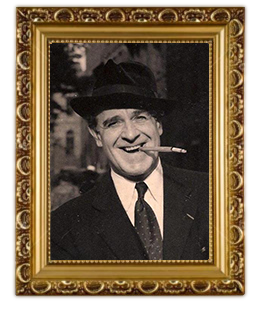5 Best Marcel Tabuteau Quotes
by Daniel Glynn
While Tabuteau’s contributions to the American School of Oboe Playing remain incalculable, his legacy might be best remembered by the many sayings passed down by the generations of his students. In addition to departing technical expertise, Tabuteau’s quotes present a deep insight into the daily workings of the professional oboist, all the while conveying the magnetism of one of the most charismatic musical figures of the 20th century. Here are 5 of my favorites...
1. “Often you must play an ugly note to bring out the beauty of the others.”
Many of Tabuteau’s quotes address the necessity of maintaining contrast within one’s playing; the ability to play with a vibrant, soaring sound and a multitude of colors. In the quote above, Tabuteau is guarding against falling in love with one single tone color, therein losing the ability to make contrast. Without contrast, the listener struggles to discern a beautiful tone from a plain one. As it’s very difficult to produce a beautiful tone, it becomes understandable that once oboists manage to do so, they can become reluctant to vary it with the occasional bit of aggressive or harsh sound. Tabuteau recognized this and repeated the above quote often enough that generations of oboists still hear it to this day.
2. “They day of only playing with feeling is gone. What if you have a cold or a stomach ache? A fine performance you would give! But if you think well, you will have a chance. Think before you play!”
The above quote provides some insight into Tabuteau’s approach towards his role as a professional orchestral musician. When sitting in the orchestra, it’s often expected that one’s performance provide the audience with an accurate representation of the composer’s intentions. As interpreters, orchestral musicians are tasked with performing the piece as the composer intended, even when this is not in line with their current emotional state. This point is also addressed in David McGill’s book, Sound in Motion. McGill, a Curtis Institute Graduate and “grand student” of Tabuteau, repeatedly stresses the importance of having a firm harmonic understanding of what is happening in the music upon which to base one’s phrasing. This theme seems to be recurring in several of Tabuteau’s quotes that he repeats throughout his teachings.
3. “Never play to please, no matter whom, only for you.”
Misinformed music scholars tend to mischaracterize Tabuteau’s teaching as overly reliant on the number system and void of genuine passion but it’s important to remember that Tabuteau always stressed the importance of conviction in one's musical idea. Tabuteau believed that one must meticulously consider every detail in the music and incorporate it into one’s phrasing, but also that it must be done with a great deal of certainty and self-assurance. On top of this, a performer must have the confidence to project their musical phrase over the orchestra. Afterall, it was also Tabuteau that famously said “You must project to the farthermost balcony, and play for the little fellow who only has fifty-cents to spend for tickets.”
4. “If a man has noble thoughts but lacks the where-with-all or technique to write them down, he's not much use to the world as a philosopher.”
The above quote speaks to the practicality of the day to day ongoings of a professional oboist. Tabuteau is implicitly referring to the necessity of having a supply of functioning reeds at all times in order to consistently perform as a member of the orchestra. So many students begin their reed making journey in utter astonishment of just how much time is required at the reed desk in order to have a working supply of reeds. It is no surprise then, that many of Tabuteau students recall him expressing the above sentiment in response to their disbelief. Tabuteau himself is seen in the video below showing empathy to his star pupil and Philadelphia Orchestra Successor, John DeLancie, on the very subject of the overwhelming nature of reed making.
5. “You know, I played for George Szell - He did not like me - but I did not like him either!”

